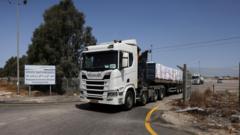Despite commitments to ease restrictions, aid remains inaccessible in Gaza, exacerbating the humanitarian crisis.
Continued Struggles for Gazans as Humanitarian Aid Remains Stalled

Continued Struggles for Gazans as Humanitarian Aid Remains Stalled
The ongoing blockade leaves Palestinians in need facing growing despair.
Three days after Israel announced the easing of its blockade on humanitarian aid entering Gaza, little to no relief material has made its way to the hunger-stricken population. Following this announcement on May 21, 2025, the situation appears grim as reports indicate that supplies, though trucks are reportedly crossing into Gaza from the Israeli-controlled Kerem Shalom border, have yet to reach the communities that desperately require assistance.
Complications have arisen due to concerns over potential looting, preventing United Nations personnel from effectively distributing aid within Gaza. “We eat only one meal a day, usually lentils or pasta,” lamented Riyadh al-Housari, a 25-year-old from Gaza City, highlighting the dire situation faced by many residents.
The prolonged blockade has placed Gazans in critical danger of famine, according to a panel of U.N.-sponsored experts, who warned that thousands of children are at risk for acute malnutrition as relief efforts remain stymied. Israeli officials contend, however, that the report's findings derive from erroneous data and assumptions.
In early March, Israel imposed a complete ban on humanitarian supplies entering Gaza, arguing that the measure aimed to compel Hamas into negotiations for a ceasefire and the release of hostages. The ongoing complexities reveal the fraught realities of humanitarian efforts amid geopolitical strife in the region.




















